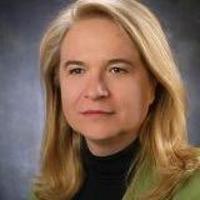Elzbieta Plaza
The passionate professor
A sunny day in March, Elzbieta Plaza and I’ve arranged a meeting over the internet. Elzbieta, or Ela as she is also called, is Professor of Water Supply and Wastewater Technology. We start the conversation with the technical aspects of wastewater treatment and Ela shares her knowledge about the development of methods and solutions in this area. We speak about phosphorus and nitrogen removal from wastewater. She is clearly apt at teaching as she mediates her research in a way I can grasp.

When I ask her why she wanted to be a scientist she tells me about her background. Elzbieta grew up in Krakow, Poland, surrounded by scholars. They impressed and inspired her as they wanted to contribute to society and made her feel the same way. First, she considered medicine but she chose the new education field in Environmental Engineering because of the combination of biology, physics and chemistry. Ela says she liked the thought of working interdisciplinary.
When she started as a doctoral student at KTH she was lucky to get a good supervisor and to work with water; finding new solutions in sewage treatment.
“Everyone can relate to water and everyone understands the need for clean water. Development of new technologies for water and wastewater treatment is one way to contribute to society” Ela says.
The big change in her career came when Elzbieta became docent 2001. From then on, she planned and directed the research herself, she supervised and hired doctoral students and built a research group of her own.
“It changed everything” she adds.
She also initiated international conferences and contributed to different collaborations. For instance, the national “VA-Cluster Mälardalen” started up in 2010, a consortium of universities, wastewater utilities and research institutes, has strengthened Swedish research internationally.
“The important goal for a scientist is to get your research results implemented under real conditions. VA-Cluster Mälardalen has given us good opportunities to test new technologies on real wastewater in treatment plants.”
Ela returns to the cooperation with doctoral students, colleagues, guest students, and international scientists. These united actions also lead to more scientific publications, something that promotes one’s research.
“If you want to reach out with your research, you cannot be alone”, she says.
I ask her about her driving force.
“Apart from being curious by nature I also love to educate. To share knowledge and see the development of my students”. Ela likes to meet new people and young people give her energy. She tries to help them with various problems and mentions an earlier Master course with fifty-five participants and twenty-seven nationalities. It was fun to learn how to treat them respectfully in different ways, to make them feel acknowledged and content.
So where is her research area heading?
One trend points out further resource recovery from wastewater and sludge, as for example recovery of phosphorus, nitrogen, valuable organic products and energy. Another trend focuses on development of technologies to remove pharmaceuticals, something that will get more urgent as new legislation is about to come.
Even if researching has been her passion, I do get the impression that Ela is good at relaxing, enjoys outdoor life and friends, to get a pause from her intense working schedule. Recently she has been offered to continue at KTH as Professor Emeritus and I ask her what changes this will mean. She laughs.
“Well, I would like to continue as long as my health allows. My husband wonders how I ever could get the energy to be retired?! This is my passion.”
Elzbieta continues:
“As our research is based on lab and pilot scale experiments, until now, I have been prepared to help out even in any practical thing if needed. But now I might leave it to others and concentrate on writing articles, education and tutoring students.”
I see Ela as generous in her efforts to get through with her knowledge. A warm person who makes people she meets feel at ease. I am glad for our conversation.
Text: Catrine Olsson
